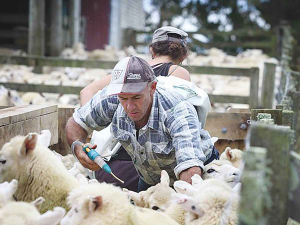NZ scientists make breakthrough in Facial Eczema research
A significant breakthrough in understanding facial eczema (FE) in livestock brings New Zealand closer to reducing the disease’s devastating impact on farmers, animals, and rural communities.
 Farmers bringing stock on to farm are urged to have a quarantine drenching regime in place to further prevent the spread of triple drench resistance.
Farmers bringing stock on to farm are urged to have a quarantine drenching regime in place to further prevent the spread of triple drench resistance.
Farmers importing stock onto their farm are being urged to have a quarantine drenching regime in place to further prevent the spread of triple drench resistance.
AgResearch scientist Dr Dave Leathwick says there has been a dramatic upsurge in the number of farms with drench resistance in the past 18-14 months, often involving several different worm species. Leathwick says, as a consequence, an increasing number of farmers are buying problems on a truck.
“There are so many resistant worms out there that farmers are now much more likely to import them onto their farms with brought-in stock.”
He says this does not just apply to those trading lambs, as several documented cases have involved farmers grazing hoggets off the farm and bringing triple drench resistance home when they return.
Leathwick believes it is more important than ever to have effective quarantine treatments or procedures in place. He says this is due to the prevalence and severity of resistance being seen around the country.
Leathwick advises that there are only two drench products which should be considered for the purpose. Those are the drenches that contain one of the newer action families – monepantel or derquantel.
“As there are only two products which meet this criterion, this choice is pretty easy.”
He says in the past, the use of combinations of the older drench families would have been recommended as quarantine drenches, but this is no longer acceptable.
As well as a quarantine drench, imported animals should be held off pasture for at least 24 hours. Where this is not feasible (e.g., unit loads of sheep or cattle) it is recommended that treated stock be held on wormy pastures for 24 hours. They should be followed by adult animals to mop up any surviving worms.
Leathwick also encourages the use of a ‘knock-out’ lamb drench in late summer or early autumn to slow or stop any build-up of resistant worms surviving the routine drenches given earlier in the season.
“In terms of what drenches are suitable for this purpose, the same rules apply, that is products containing the newer action families.” he explains. “There is so much resistance around today that it’s just not worth the risk of using something else.”
Leathwick says the escalation of triple resistance is causing issues for sheep farmers all around the country. It can profoundly affect farmers’ ability to control parasites and continue to farm as they have in the past.
“Those that don’t have it yet need to be extra vigilant to make sure they don’t get it.”
The Meat Industry Association of New Zealand (MIA) today announced that Chief Executive Officer Sirma Karapeeva has resigned from the role.
The winners of the 2026 Hawke’s Bay/Wairarapa Dairy Industry Awards were announced at the annual awards dinner held at Copthorne Solway Park in Masterton on Thursday evening.
Environment Southland is welcoming this week’s decision by the Environmental Protection Authority (EPA) to approve the release of Blaptea elguetai, a leaf‑feeding beetle that will help control the highly invasive Chilean flame creeper.
This March, the potato industry is proudly celebrating International Women’s Day on 8 March alongside the International Year of the Woman Farmer, recognising the vital role women play across every part of the sector — from paddocks and packhouses to research, leadership, and innovation.
Fruit trader Seeka posted a record profit and returns to shareholders in 2025.
Recent weather events in the Bay of Plenty, Gisborne/Tairawhiti, and Canterbury have been declared a medium-scale adverse event.
OPINION: Staying with politics, with less than nine months to go before the general elections, there’s confusion in the Labour…
OPINION: Winston Peters' tirade against the free trade deal stitched with India may not be all political posturing by the…